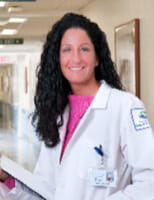
“I was born into a deaf family. I’m not sure if I was born with a hearing impairment or if it happened when I got an infection as a young child. We communicated using American Sign Language—in fact, that was my first language.
“Given that I had some hearing ability, my family relied on me to be their interpreter—making phone calls, talking to adults—and it put a big responsibility on me as a child. So as I got older, I tried to run away from the hearing-impaired community as fast as I could. But by the time I reached college, I had regained my ties with the deaf community and made my peace with it.
“When it came time to choose a thesis for my dissertation at Walden, I initially thought I wanted to work on hearing impairment and eating disorders. After doing some research, I saw how difficult it would be to tap into that particular community. So I said to myself, ‘What resources and population groups do I have access to?’
“Since I was already a social worker, I realized the topic of comparing the effectiveness of psychotherapy treatment methods within the hearing-impaired community was staring me right in the face.
“I studied the different rates of effectiveness in treatment outcomes for those who worked with therapists who used sign language, versus those who worked with non-signing therapists paired with interpreters. I conducted a survey with both sets of therapists and their clients, and the results clearly demonstrate that outcomes among deaf clients with a signing therapist improved over time, whereas outcomes among deaf clients with a non-signing therapist did not.
“Walden was a huge help in my ability to conceive and complete this project. My fellow students were amazing! We would often meet late at night, on chat or the phone, and sometimes some of us in neighboring states would get together to study.
“Ultimately, I would like to continue leveraging research to create more support services for the hearing-impaired community. For example, therapists who work with the deaf community need more training opportunities. In addition, the therapists need better visual tools—the deaf community tends to be behind in reading comprehension levels because it is harder to learn to read without hearing pronunciation.
“What all this boils down to is equal access—the deaf community does not yet have equal access to behavioral healthcare services. There is so much work still to be done!”
Dr. Amy Storch, a PhD in Psychology alumna, is a licensed clinical social worker for the Hospital of Central Connecticut in Southington. She also teaches graduate social work students as an online adjunct professor for the University of New England.
Tell us about your Mission Possible at [email protected].



